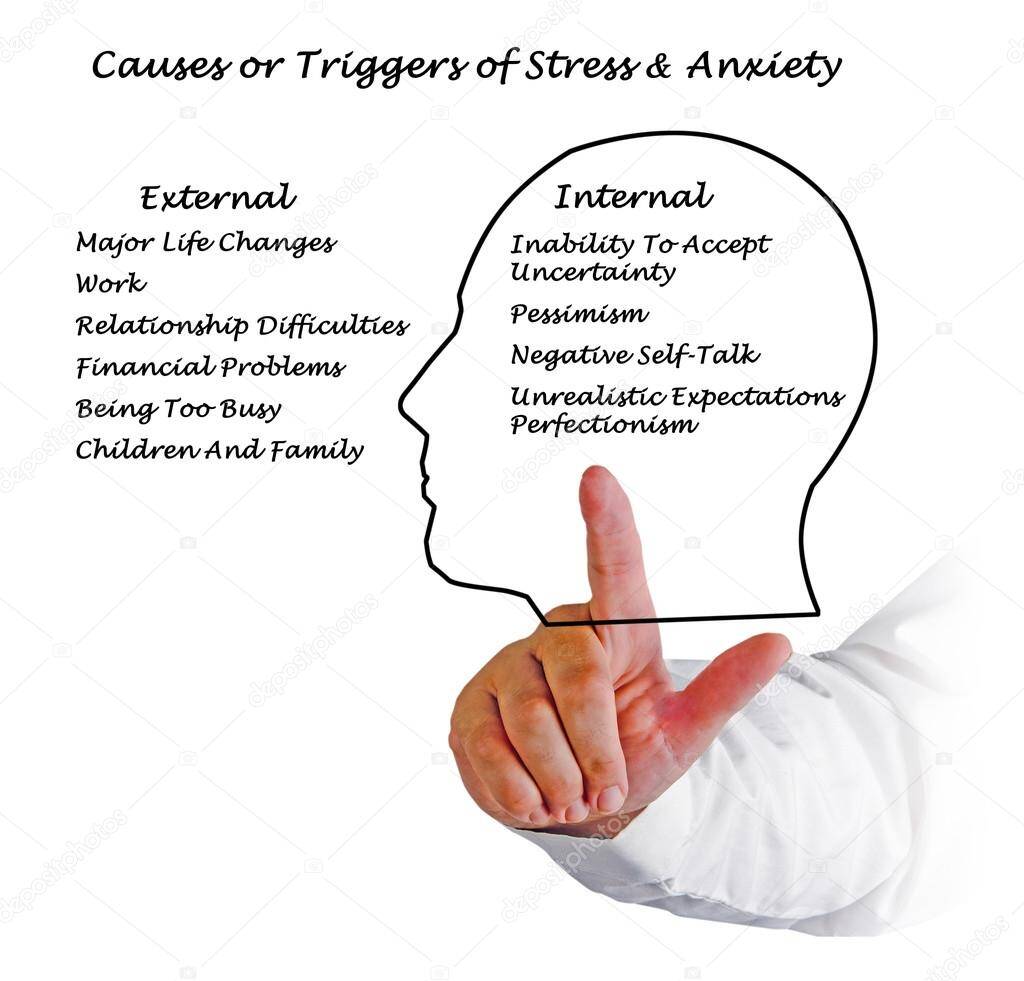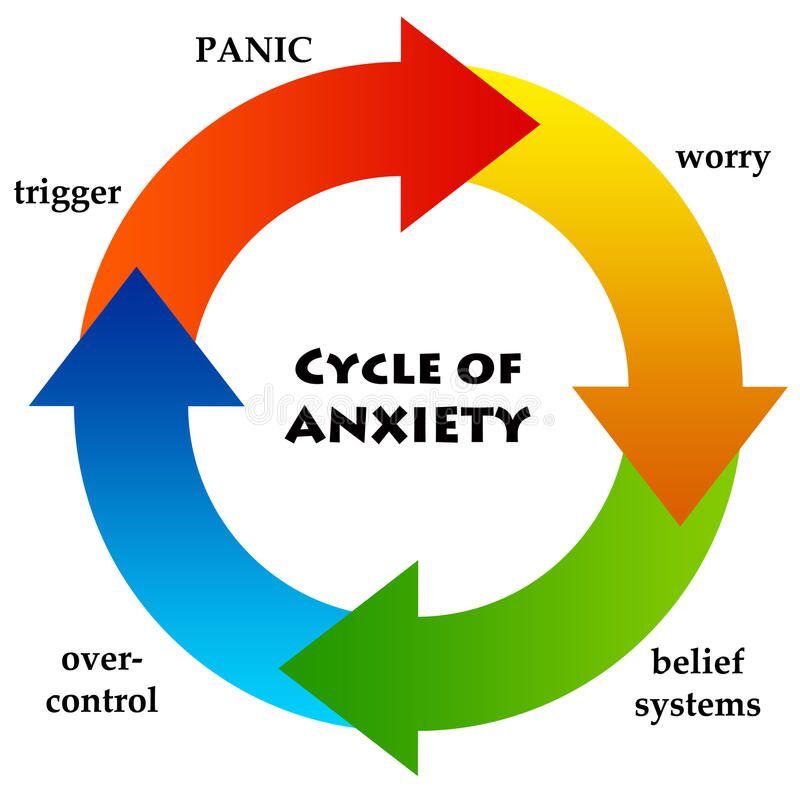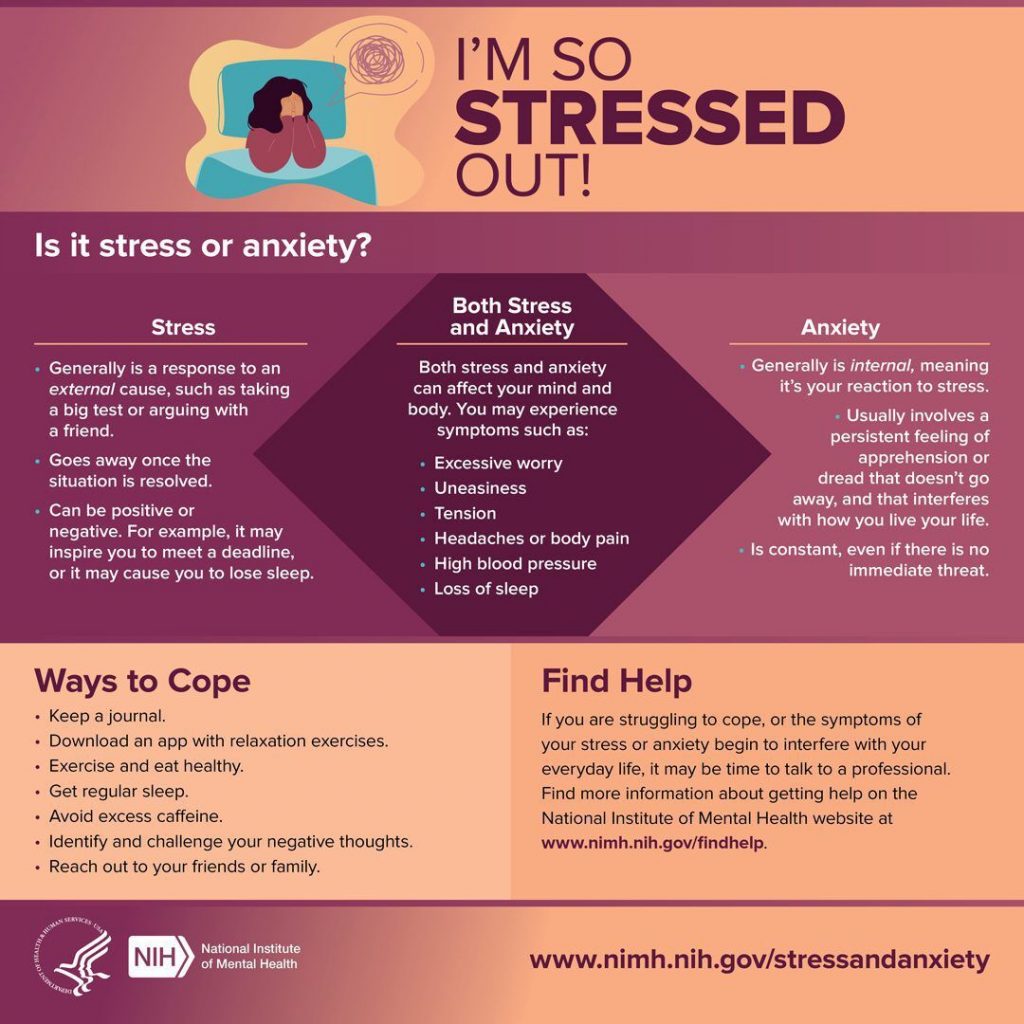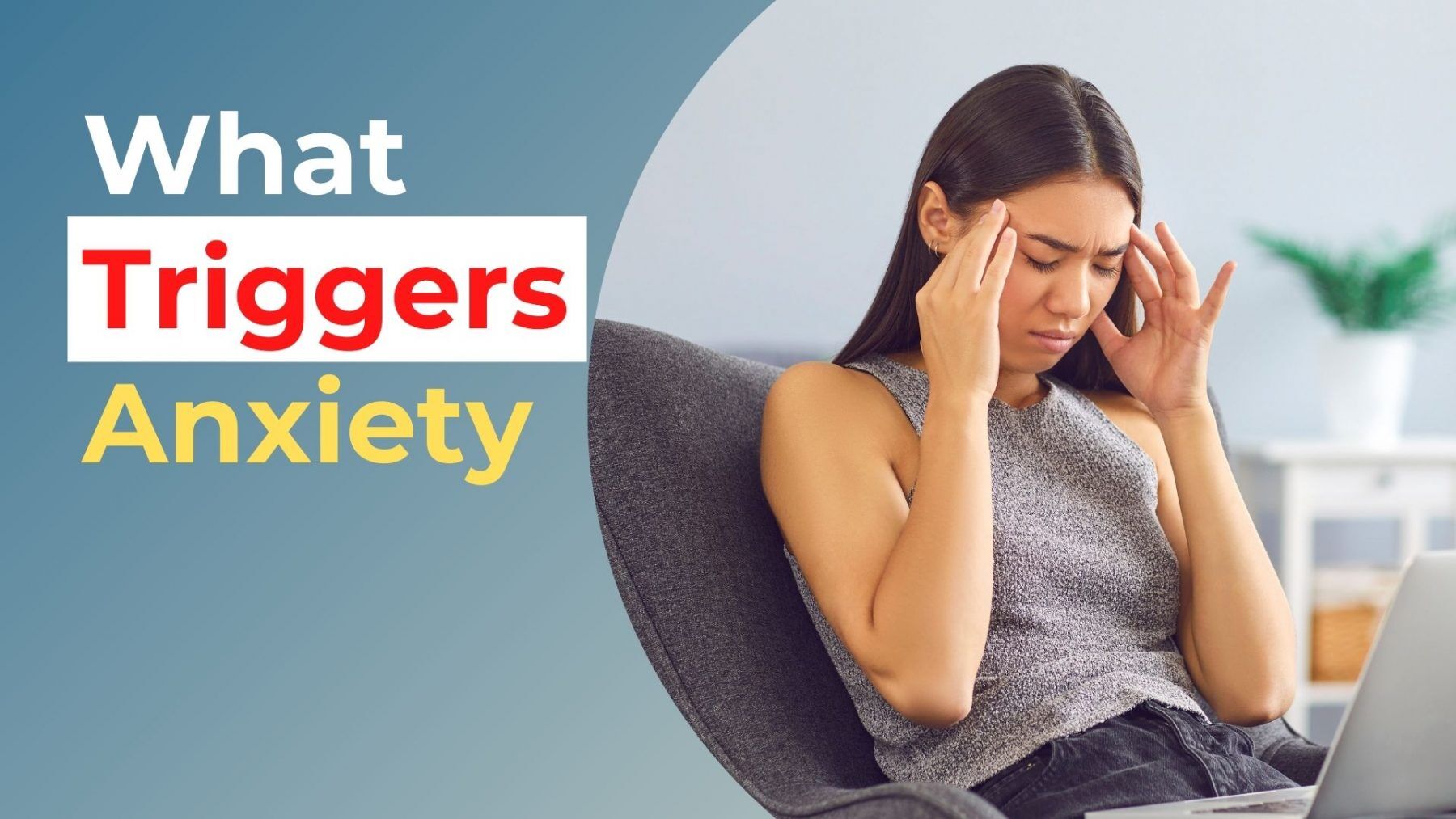Anxiety is a feeling that many people experience from time to time. But for some it can be debilitating and impact every area of their life.
An estimated 40 million people in the U.S. have anxiety disorders, according to the Anxiety and Depression Association of America.
Identifying your triggers is an important step in managing anxiety disorders. Keep reading to learn about these anxiety triggers and what you can do to manage your anxiety.
That way you’ll know when to take action against them!
What Is Anxiety?
Anxiety is “a feeling of worry, nervousness, or unease, typically about an imminent event or something with an uncertain outcome.”
Anxiety is so pervasive in society today that it affects one out of every five adults.
Despite this, identifying anxiety triggers requires significant time and energy, but doing so can allow an individual to develop the proper coping techniques for managing their condition.
First thing is understanding that anxiety is often your brain’s natural response to a perceived threat.
When you’re anxious, for example, it might feel like everything around you is wrong and there’s nothing you can do about it.
This particular feeling stems from the fight-or-flight response. This response helps people in danger to escape threats by either fighting or fleeing.
The key feature of the fight-or-flight responses is your brain shutting down.
We’ll talk more about the brain down below.
You should know anxiety takes many different forms besides fighting and fleeing:
- floating (disassociation)
- freezing (when your mind and body go completely blank because of overwhelming anxiety)
How Does Anxiety Affect The Body and Brain?
Anxiety affects the body in many ways and it can lead to physical symptoms such as:
- rapid breathing
- sleeplessness
- restlessness
- feeling like you’re rocking back and forth on your feet
- nausea or ‘butterflies’ in your stomach
- heart pounding
- sweaty palms
- stuttering speech
It also impacts the brain by releasing cortisol, which is a hormone that relates to stress responses, nto the bloodstream.
All these physiological and mental changes make your brain shut down.
This is why when you are anxious you overreact and think things are more dangerous than they really are.
In more extreme situations people can develop anxiety disorders, a mental health disorder characterized by feelings of worry, anxiety, or fear that are strong enough to interfere with one’s daily activities.
Examples of anxiety disorders include generalized anxiety disorder or social anxiety disorder, panic attacks, obsessive-compulsive disorder, and post-traumatic stress disorder.
There are easy ways to evaluate your mental health and discover early signs of anxiety such as doing an online anxiety test.
What Are Triggers For Anxiety?

Anxiety triggers are varied and range from the big to the small.
Major events like car crashes or financial troubles can be triggers for anxiety.
But many times anxiety is triggered by smaller events, and in some cases this can worsen a pre-existing mood disorder.
Things like bipolar disorder, depression, or an eating disorder can trigger symptoms of anxiety.
Being exposed to a traumatic event such as a friend’s illness, feeling unsafe at work or home, or even worrying about an upcoming meeting can trigger anxiety.
And sometimes it’s being in an unfamiliar environment – such as being away from home for the first time on your own.
Specific Anxiety Triggers
If anxiety is a feeling we get when we feel threatened, then what causes us to get threatened in the first place?
Well, since anxiety affects 1/5 of people, we are going to have a lot of different triggers, although !
Please note some triggers are more common than others.
It’s important to know your personal triggers because then you can avoid them or prepare for a tough situation beforehand.
Here is a list of some potential anxiety triggers:
- Being in an open space with lots of people around, like school, work, or even at the mall
- Feeling unsafe due to violence happening nearby (e.g., shootings)
- Not having control over something that feels like life and death (e.g., making decisions about who takes care of children if one parent dies)
- Public speaking
- New situations that are unfamiliar
- Feeling like you’re under pressure and can’t take a break (e.g., deadlines)
- Aftermath of an accident or traumatic event
- Being exposed to extreme weather conditions
- Losing someone close to you, especially if it is sudden (e.g., death by suicide)
- Anxiety disorders for which there may not be a known root cause such as panic disorder and generalized anxiety disorder
Finally, remember some people experience more triggers than others based on various factors:
- demographic factors
- their life experiences
- what kind of jobs they have/take part in
- where they live – some areas tend to be safer while other areas might feel less safe at times due to crime rates
- economic status
- education
But the worst thing about anxiety is how anxiety often creates more anxiety!
How Anxiety Causes More Anxiety!

Let’s say you have to give a public speech. But social situations are one of the major causes of anxiety for you.
So when you get up to speak in front of people you stutter and give a poor presentation.
After the speech you say to yourself, ‘I am a terrible public speaker!-
You come to the logical conclusion that you are terrible at public speaking.
Then the next time you are to give a public speech, you have already ingrained social anxiety as an anxiety trigger!
Soon you are anxious at the very thought of giving another public speech, when you aren’t even giving a public speech yet!
If you think about it, anxiety triggers become like a self-fulfilling prophecy.
Today we know more about how anxiety triggers impact your health. And we also know how anxiety triggers create more anxious negative cycles too.
Let’s now shift gears and talk about some ways to cope and improve your mental health!
Perceived Threats To Survival Trigger Anxiety
The one thing all anxiety triggers have in common is they are perceived threats to your survival.
And feelings of anxiety can be exacerbated because our society makes mental illness seem shameful or a sign of personal weakness.
But anxiety actually is a natural response to what feels dangerous.
Notice the phrase “to what feels dangerous.” Your brain doesn’t always know the difference between real threats and perceived threats.
Your brain reacts to both types of threats because it thinks both are equally important to your survival!
And this means you could experience feelings of anxiety whether faced with a life-threatening situation (real) or a social situation where you’re not completely sure how others will react to you (perceived).
And doing any new activity without knowing exactly what’s going on can trigger the perceived type of anxiety!
Even though you’re not going to die when you try something new, your brain still perceives this newness as a threat and gives you feelings of anxiety.
Here’s an anxiety triggers example:
You are going to play guitar for the first time in front of a friendly audience.
Of course you will survive playing guitar. Nobody is going to kill you. But your brain doesn’t know the difference between a real threat and a perceived threat like social anxiety!
In this case the potential disapproval or rejection from the friendly audience is enough for your brain to trigger anxiety!
Why Your Brain Is Sensitive To Threats
Your brain’s job is to keep you safe and alive.
Your brain can detect threats in the environment, like predators or things that cause injury. If the threat doesn’t go away, this triggers an alarm response called anxiety!
Anxiety disorders are where this alarm is overly sensitive. In cases of an anxiety disorder, the ‘anxiety’ alarm gets set off at a lower threshold.
In these cases, even leaving the house to go grocery shopping can seem terrifying!
(The technical social anxiety disorder for ‘fear of leaving the house’ is called agoraphobia)
Another word for anxiety means “when we feel threatened.”
So when people are anxious then their brains perceive danger even where there isn’t any-and they’re on high alert!
Just think about it (part 1):
Say your heart rate is up, your palms are sweaty and you’re feeling scared. Then you hear a loud noise!
You are WAY more likely to trigger anxiety at this loud noise than you were if nothing was going on at all.
In this situation your brain perceives a threat and so acts to keep you alive!
Just think about it (part 2):
Say a dog attacks you and scratches at your face. How would your body respond?
- Your heart rate would increase
- Blood would leave your organs and go to your arms and legs to help you fight (this is why your hands get sweaty)
- Your brain shuts down so you make split-second life or death decisions without thinking
Do you see how these anxiety symptoms are very normal reactions in a life or death situation?
Aren’t these the same symptoms found in social anxiety?
Again, this is because anxiety means you feel threatened!
What Are Ways To Cope With Anxiety and Anxiety Disorders?

To overcome anxiety and panic, you need to master some fundamentals if you are serious about overcoming anxiety.
Here are the fundamental practices underlying all types of advice, diagnosis or treatment for anxiety and anxiety disorders:
- Sleep
- Eating
- Mindfulness
- Exercise
One of the easiest ways to get more sleep is by setting a bedtime (even if it’s an hour early). Get seven hours of quality sleep each night at least!
This will help reduce anxiety triggers. Because when you get enough sleep, you’ll feel less anxious throughout the day!
For example: You’re feeling overwhelmed at work so you reach out to ask for a raise or promotion from your boss. But they say “no.”
This triggers an anxiety response, and you end up binge eating to calm down.
But if you had eight hours of good quality sleep, then this response wouldn’t have been as upsetting to your mental health.
But with lack of rest even minor setbacks can seem very distressing!
This same principle applies to mindfulness, eating and exercise!
Incorporate these daily foundations into your life and the root of anxiety is cut!
Here are some more specifics on these foundational practices:
- Take care of yourself by getting enough sleep
- Eat healthy foods and limit alcohol intake
- Engage in physical activity including walking. This boosts serotonin levels (an important hormone relating to mood)
- Try yoga if you have trouble sitting still when anxious. Find relief via movement or stretching.
- Learn breathing exercises as well. These help people calm down when they’re anxious.
- Practice thinking patterns with constructive themes, like “I can handle this” or “This will be over soon.”
If these still don’t work, consider talking to a therapist. Talk to them about new strategies for coping with anxiety, including using Cognitive Behavioral Therapy (CBT).
Final Thoughts
Anxiety is a complex condition that varies from person to person.
It can be triggered by many different things, and it affects the body and brain in various ways.
If you are struggling with anxiety, then hopefully this blog post provided some insight into what triggers anxiety for you.
The important thing is to see how your anxiety may manifest within both your mind and body.
For more information on advice, diagnosis or treatment for people living with anxiety and overeating disorder please learn more here.


